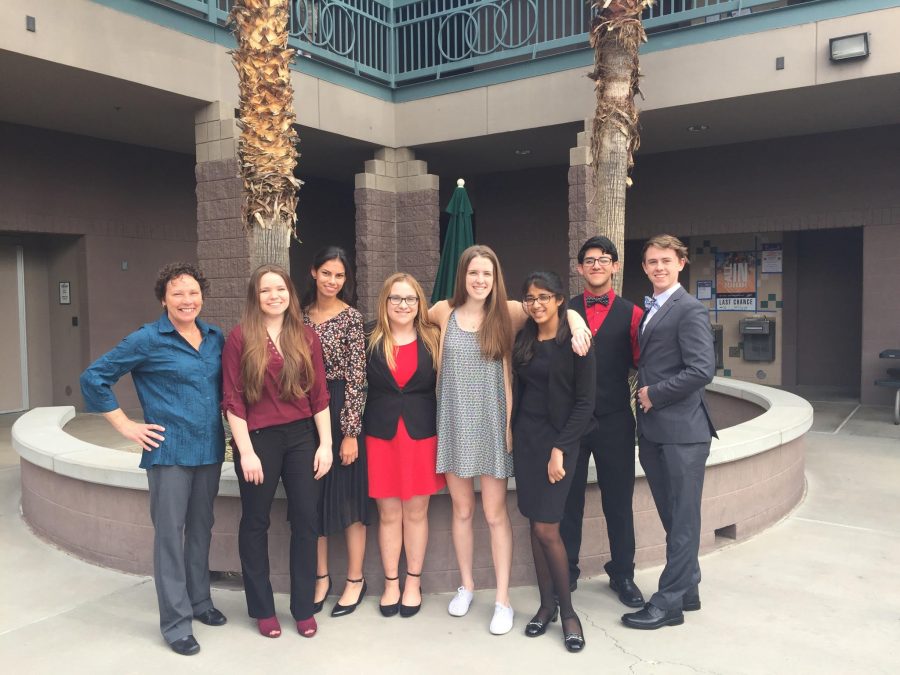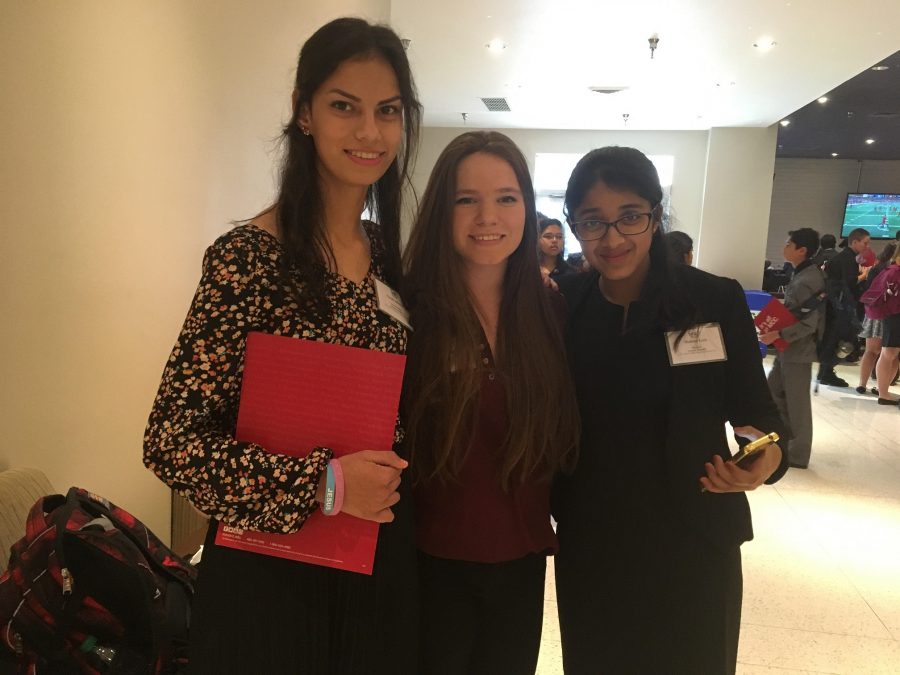My Model UN Experience
On Friday, Feb. 3 and Saturday, Feb. 4,2017, I had the chance to go to Mesa Community College (MCC) to a Model United Nations conference as a delegate from Indonesia.
Club sponsor Michaela Burns, freshman Allison Hale, freshman Nicole Johnson, freshman Hannah Browning, senior Kelleigh Hogan, freshman Mahika Goel, senior Cameron Vega, and senior Cameron Noble went to Mesa Community College for Horizon Honor’s first Model Un conference.
February 6, 2017
Contrary to what a couple of my classmates seem to think, Model UN is not a fashion club. Model United Nations is a club or, in some schools, a class, where students pretend to be a delegate from a country and have conferences similar to those of the United Nations where they try to pass resolutions that they worked on with other countries that express their country’s wishes. I personally spent weeks researching my topics, days writing my policy statements, and hours writing my speeches. This was the first year Horizon Honors had a Model UN club, and only seven students would be going to the conference at MCC. I was extremely nervous but also excited to see what it would be like.
Day One:
At school on Friday, all I could think about was the conference. I had no idea what to expect, and neither did anybody else. The day went by quickly, and before I knew it we were driving to MCC. On the ride, I made some of the other members of the club read my speeches because I was scared they weren’t good enough, but when we got to the college I calmed down. We walked in, signed in, and were given a folder. We also had to have name tags that said our name, country, and committee.
We all sat together in a room for the opening plenary. There were multiple speakers, and they talked a lot about cultural acceptance and refugees, which surprised me. I was expecting to hear more about the United Nations, but then they related the acceptance to the importance of Model UN and the future generations understanding other cultures’ problems. Finally, they announced what rooms the committees were in, and it was time for us to go.
I am slightly embarrassed by this, but I am horrible with directions and was terrified of getting lost. Luckily, senior Kelleigh Hogan was on the same committee as me, and since she can actually read a map, was able to show me where the room was. Once we entered the room, there were desks with placards that said the country names. Hogan and I each went and sat down, and I was sitting next to the delegate from India. We started talking, and he gave me a list of short rules. That is when I realized how important it is to make friends at these conferences.
After a couple of minutes, it finally started, and the chair took attendance. Some people eagerly jumped up to say their country was present, and that was when I realized that this was not going to be easy. I am used to being one of the most motivated people in the room, and it was not going to be the same here. It seemed as if everybody here was completely obsessed with Model UN, and was here to win. My confidence started to fade.
When it was time to raise my placard to be on the speaker’s list, I couldn’t do it. In fact, I wasn’t sure if I wanted to participate in the discussion at all. After listening to a couple speeches, I didn’t feel like I was researched enough. There were countries calling out other countries during their speeches, and they did not hold back at all. I used to think I was too competitive, but clearly, I hadn’t met the delegates from the United Kingdom or Syria before. Delegates could respond to speeches with a P-23 or P-25 motion, which were orders that were mostly used for questions or comments. Again, countries would call out other countries, and I didn’t want to attack anyone like that. However, I made it my goal to speak at least once that day.
After a couple speeches, a delegate called for a P-27, which was a suspension of the meeting. They could call for a moderated or unmoderated caucus for a certain amount of time. During this time, delegates would talk to each other about their countries’ points of views and hopefully start a working paper. I was too scared to talk to somebody, so I went to Hogan and didn’t really talk about policies, but then other countries came up to us. I actually did better than I expected when talking about my country and knew I was more prepared than I thought.
Later, the delegate from the Philippines came up to me and wanted to start a working paper. I couldn’t be happier, because I didn’t know where to start when finding other countries. We gathered some other delegates whose countries had similar views and began our working paper.
This definitely boosted my confidence, and once we went on with the speaker’s list, I raised my placard to ask Bosnia a question. I had reached my goal, but after a couple more speeches I decided to ask Singapore a question. After that, it was time for dinner, and I sat at a table with everyone from Horizon Honors. The next two hours went by super fast, and before I knew it we were driving back to school.
Day Two:
On the second day, I was feeling a lot better about the conference and was ready to push Indonesia’s views on the other countries and get a resolution passed that supported my country’s agenda. I also wanted to speak that day and had freshman Nicole Johnson read over my speech to see whether or not she thought I should say it. Of course, no matter what she said I would try to get on the speaker’s list, and luckily she thought I should say it.
My committee started out that day with a P-30, where we had 30 minutes to finish our working papers and get a resolution submitted. I will admit that I did not help much with the working paper. The delegates I was working with had decided to merge with another a group of delegates, and I’m pretty sure everything I had written ended up getting deleted. Once all the resolutions were submitted, we voted to move on to the second topic.
It was finally time for the speaker’s list to be decided. I actually raised my placard, despite the fact that the whole time I kept thinking that I was making a mistake. I had seen how aggressive some of the delegates could be, and wasn’t sure if I was ready to respond to them. However, I was still placed on the speaker’s list and was proud of myself for trying, This was a new experience for me, and I wanted to learn all I could. That might include making some mistakes, but that’s okay.
The second topic went by much more smoothly. I could tell everybody felt more prepared, and everybody was participating more. I still managed to ask the delegate from Honduras a question and say a comment to Japan, and during our first unmoderated caucus I went to Egypt and asked her to work on a working paper. She agreed and got more countries to work on it with us. Unfortunately, our committee was only allowed two working papers, so I was not able to contribute much to the working paper. After all, there were around 60 people in our committee, and having about thirty people working on one paper that is only two pages can get quite crazy. Soon enough, it was time for lunch.
At lunch, I still sat at a table with students from Horizon Honors. My speech would most likely occur after lunch, and I was quite nervous. The club sponsor Michaela Burns told me to talk to some delegates and see if they would ask me questions I felt comfortable with. The delegates from Japan, Canada, and Afghanistan were open to asking me questions I told them to, so I was feeling much better when I went back to the room.
When we went back, I raised my placard to say a comment for Pakistan. A delegate called for a P-30, where we had 30 minutes to finish our working papers. It was great that we were able to finish, but it meant that I would not be able to give my speech. I was disappointed but definitely felt relieved. After the papers were submitted, we moved on to voting on the resolutions. Both of the resolutions I had helped with ended up getting passed, and although I had not contributed much, I still felt proud.
We left the room and went to the closing plenary and awards ceremony. It started with a video of the importance of the United Nations, and then they went on to announce the awards. Although no one from our school won an award, I think we did amazing and can’t wait to see what the future of this club will be like at our school.
Horizon Honor’s Model UN club is having a fundraiser starting Monday, Feb. 6 through Friday, Feb. 10, 2017. We need donations for goodwill. Goodwill is paying us by the pound so the heavier an item is, the better. The club is raising money for a conference at the University of Arizona. Anything is helpful, so please consider donating to this amazing club.










